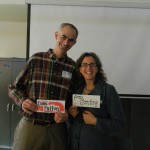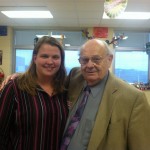Belonging
Forums › 2023 Summer Seminar › Belonging 2023 Summer Seminar Responses: due JUNE 8 (or earlier) › Belonging
-
AuthorPosts
-
-
June 10, 2023 at 4:54 pm #31796
I also enjoyed the fact that this memoir was written in graphic novel form, and I don’t even like to read graphic novels that much! I liked the photos, drawings, clippings, and the “Things German” that made the author homesick.
I was struck by how complicated political/personal life was during the war years, for example Krug learning that her grandfather wasn’t a Nazi at heart (maybe) but claimed he had to join the Nazi party in order to earn a livelihood for his family. That while those who supported him with letters to the court argued he wasn’t really a Nazi, the court found him to be an offender. I was also struck by the pain Krug felt upon visiting her father’s attic room, “all-consuming as a paper cut, because even inherited memory hurts.” And then this feeling followed by another one, “like a half-empty room with infinite layers of wallpaper, each one exposing what was there before.” Those quotes resonated with me, particularly the latter, because I share Krug’s desire to know parts of my family history that are now unknowable, because too many people are gone. There are so many questions I want to ask now that I didn’t know or think to ask when my parents were alive. My parents had me late in life; my father served in WWII in the U.S. Navy, entering in 1945 doing “cleanup duty” as he called it. I was 16 when he died (but he was lost to us long before that) and I never learned what he did and saw during the post-war period.
Clearly bringing up the past made the people Krug interviewed feel uncomfortable, caused pain, although some seemed to want to unburden themselves or at least bear witness. There was a shared shame, and a kind of painful reckoning with the past, which I assumed would translate into a kind of national feeling of “never again.” Which is why Krug’s mention of the rise of the extreme right was so jarring. It’s just three lines in her book, but it carries such a terrible foreboding.
What is my “heimat?” It’s definitely not the hometown I grew up in, a suburb of Boston that is very white and where my family fell apart. My mother was British descent and my father’s parents were Swedish immigrants. I never knew my grandfathers, and I spent more time with my English nana than I did with my Swedish grandmother. In my imagination, my heimat is a quaint village in England or Scotland where a proper cup of tea can be had anywhere. I have visited Great Britain twice, and my sense that that is my heimat mostly comes from inherited memory; I heard a lot about England from my mother and her mother and being there I did feel a sense of familiarity. In that respect, I agree with Krug that heimat “can only be found again in memory,” – in my case inherited memory- but not with what Krug says next, “that it is something that only begins to exist once you’ve lost it.” I never really had it to lose it. But I feel, every time I walk through the beautiful, forested landscape of western Massachusetts, that I’m creating a new heimat for myself. -
June 12, 2023 at 12:34 pm #31818
I totally agrre with you Leslie.I too paused to reread “Things German” a few times. I went through the book again yesterday, focused on Nora’s depictions of her memories. The symbolism in the pictures and photographs made me book amrk a few pages for further discussion. Her vivid recollections of the complicated structure of her “Heimat” I suspect will continue to hunt her for a long time.
-
-
AuthorPosts
- You must be logged in to reply to this topic.
Recent Replies
Recently Active
-
Active 7 hours, 42 minutes ago
-
Active 2 days, 10 hours ago
-
Active 1 week ago
-
Active 1 week, 4 days ago
-
Active 1 week, 4 days ago
- View All Members






